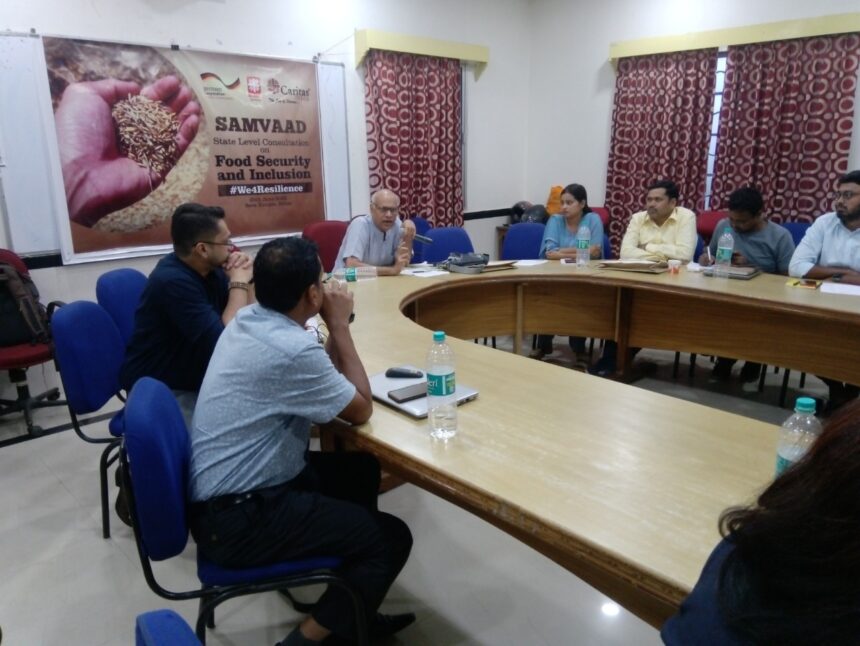“SAMVAAD”, A state-level consultation on Disaster Risk Reduction, Nutrition & Food Security and Social Inclusion, was a joint initiative of Bihar-Inter Agency Group and Bihar State Disaster Management Authority organized on 28th June at Patna. The SAMVAAD was organized to co-create a space of dialogue, aiming to enhance the positive engagement of multi-stakeholders towards building resilient communities in the sphere of disaster preparedness, food security, and inclusive development. It was also with the objective of strengthening networks in addressing underlying causes of risk, coming up with attainable recommendations to link communities with state and national level platforms and build their resilience to disasters. The IAG members namely, World Vision, PHIA Foundation, Water Aid, Yuganter, OXFAM India, CASA, IGSSS and Caritas India participated and shared their invaluable inputs on the role of networks.

The 2 days workshop was planned as per 3 thematic areas namely, DRR, NFS and SI, and had a few technical sessions from the delegates. The first day of the SAMVAAD was dedicated to Disaster Risk Reduction. The speakers spoke about the Importance of networks at state as well as district chapters and emphasized the role of IAG District coordinators for better-coordinated efforts in Disaster risk reduction. The Open session emphasized streamlining recommendations based on the experience sharing for the day. One of the focal areas suggested was the provision of Set up District chapters of BIAG. Regional consultations at the district level to be hosted by members (on monthly basis).

The Global Programme team shared the findings of the #We4Resilience Campaign. Caritas and its Partners Covered 80 Villages (70 villages and 10 Urban wards) in 05 District under the campaign and initiated the process with the Identification of volunteers and other stakeholders, Poster Exhibition & village SAMVAAD. The Presentation at State brought Village recommendations such as Establishing Robust early warning System, creation of an “Emergency Fund” at the Village level, and Strengthening Health facilities during emergencies.
Ms. Vandana Chauhan State coordinator IAG conclusively summarized the overall recommendations into – Effective collaborations of stakeholders with government machinery and local governance at different levels, collective responsibility and convergence of best practices and approaches to DRR and resilience building through networks and integration of the most marginalized risk populations at the risk mapping and planning levels. It was unanimously agreed that there is a need to establish district chapters of BIAG where they currently do not exist while ensuring their effective activation where they are non-functional.
Day 2 of the workshop was dedicated to NFS & SI. Ms. S Divya Shafeela, Associate Director, World Vision India shared her views on solutions to ensure nutrition security among marginalised communities and talked about structural and cultural hurdles that they encounter during the process. She emphasized on the need of conducting gap analysis to have some concrete information on the nutritional status of a marginalized communities.
Mr. Rupesh Kumar, Convenor of Right to Food Campaign Bihar, talked about the public distribution Systems and Aanganwadis. Further, he said that we as CSOs must initiate a dialogue with the government regarding standards and the calculation of ration supply. The CSOs leaders must use this platform to also advocate their issues with line departments and should come up with a proper plan to provide food security during a disaster, said Ms. Vandana Chauhan, BIAG Coordinator Bihar.
Mr Rishu Prakash from UNFPA talked about illiteracy and social and cultural norms as the main hurdles. Mr. Prakash welcomed all the CSOs to work and collaborate with UNFPA for building policy-level dialogue and better implementation of government services.
There will be not any possibility of a successful programme with the Inclusion of the community. Land lessness is one of the basic problems of Dalits community. Land leads to basic needs and rights such as shelter, food, and livelihood, Said Mr. Kapileshwar Ram from Dalit Adhikaar Manch.
An educated and healthy people could contribute to the development of society. Total literacy rate in rural Bihar is only 43% and literacy among lowest rung of society is few percentages. Right to education act enacted in 2009 with the holistic approach towards achieving quality education in schools. Community engagement in schools such as SMC, MDM has initiated to bring community ownership towards their children education. But it 12 years past there is huge gap in RTE implementation. Teachers’ engagement, less infrastructure, lack of basic services, lack of teachers etc are the primary challenges in all the schools. Said Anil Kumar Roy from Right to education Foum Bihar. RTE Forum in Bihar is continuously working and advocating with government along with other CSOs for quality education in Bihar.
After this Mr. Pradipta Kishore, thematic lead, Caritas India, presented a small presentation from learnings from SAFBIN programme on community-based nutrition model so that the good practices from the programme can be adopted in the state. Along with this Mr. Sushant presented model of kitchen garden as a tool for eradication of malnutrition to audience.
Each day, the workshop ended with the discussion and insights on #We4Resileince campaign findings. The Caritas India team also came up with 16-point action agenda for the upcoming months, based on the reflections from the experts and agencies in the course of 2 days.


Leave a Reply